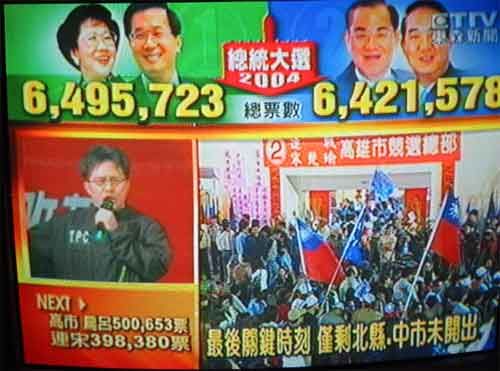How DARE You Flaunt Your Democracy!


Last week, 2-time elected President Chen Shui-bian of Taiwan angered China by doing something that self-governing democracies all around the world take for granted. He made a decision to stop the current operation of a government organization.

The government organization he stopped funding to was a committee that was set up by a previous Taiwanese government that was unelected at the time. You see, Taiwan has been a democracy for only the past 10 years. It has become beacon of freedom and human rights in the center of East-Asia.

The reason President Chen Shui-bian stopped the operating of this organization was because it was a body that was dedicated to unify Taiwan with China, exclusive to the will of the people in this democratic country. The president, as well as the opposition leader, want the Taiwanese to decide the fate of their nation.

The PRC government, unelected by the people of China, do not want the people of Taiwan to decide their fate. You see, they already believe that the country of Taiwan belongs to China. They even went so far as to make a law stating that the Taiwanese people do not have a choice in this matter. The Anti-Secession law, which arguably breaks the fragile status-quo between the two nations, was enacted in March 13, 2005.

When President Chen Shui-bian closed down the National Unification Council last week, the Chinese government barked very loudly. In fact, it is still doing so. The amount of propaganda by the Chinese media has increased exponentially on this issue since the decision was made.
SHAMELESS IRONY
This is very ironic, since the Chinese government once protested the formation of the National Unification Council AS BEING AN OBSTACLE TO UNIFICATION!


![]()

Nonetheless, China has again made this a very high-profile issue amongst it’s allies

So, when President Chen Shui-bian gave his speech about the fate of the NUC, he chose his words carefully. Instead of “abolish”, he used the phrase “Cease to function”. He made it very clear that this decision was made to further democracy in Taiwan and he also made it clear that this did not, in any way alter the status-quo between China and Taiwan. If the opposition in Taiwan wished to re-assemble this organization, they could do so, granted they won the next election. China was doing it’s usual huffing and puffing, but this was not an action that would bring war to east asia by any stretch of the imagination.

So, how did Taiwan’s biggest ally, the United States of America, respond to this excersise towards greater democracy? Did the “freedom is on the march” drums start beating?

Not exactly. At first, the U.S. State Department issued the meme that they were assured that nothing had changed — the status-quo, that is. Chen’s closest ally didn’t exactly give a high endorsement of the idea, but they were satisfied that Chen had done nothing too extreme. And then, last Thursday, Taiwan’s closest ally issued this statement to the public:
Press Statement
Adam Ereli, Deputy Spokesman
Washington, DC
March 2, 2006
Taiwan Senior Taiwan Officials’ Comments on National Unification Council
We have seen reports that senior Taiwan officials have said, with respect to the National Unification Council, that there is no distinction between “abolish” and “ceasing activity” and that the effect of Taiwan’s action earlier this week was to abolish the Council.
We have been informed, however, that the reports misquoted Taiwan officials. We expect the Taiwan authorities publicly to correct the record and unambiguously affirm that the February 27 announcement did not abolish the National Unification Council, did not change the status quo, and that the assurances remain in effect.
Our understanding from the authorities in Taiwan was that the action Taiwan took on February 27 was deliberately designed not to change the status quo, as Chen Shui-bian made clear in his 7-point statement.
Abrogating an assurance would be changing the status quo, and that would be contrary to that understanding.
We believe the maintenance of Taiwan’s assurances is critical to preservation of the status quo. Our firm policy is that there should be no unilateral change in the status quo, as we have said many times.
Released on March 2, 2006
The U.S. State Department, through this press release, signalled that they were not going to fully endorse his decision. In fact, by not addressing Chen Shui-bian as “President” in this statement, it signals much unhappiness about what he has done. They wanted President Chen to clear up this “confusion”.

But guess who reported that “there was no difference” in the wording?

Voice of America apologized today for getting the report wrong. A report that the U.S. State Department relied on to make their critical-sounding press release. What’s more, before the U.S. State Department made this release, they DID NOT consult anyone in Taipei. It would seem that the purple fingers were not out for Taiwan this time around.
In fact, The People’s Republic of China is actually using the U.S. State Department’s press release in their propaganda in the last couple of days. Headlines such as “US urges Taiwan to correct comments on council” are all over the China press.

So, the question is — Why is the U.S. slapping it’s ally in the face for being too democratic?




…deserves better!
If only Taiwan were financing more of our nation’s debt.